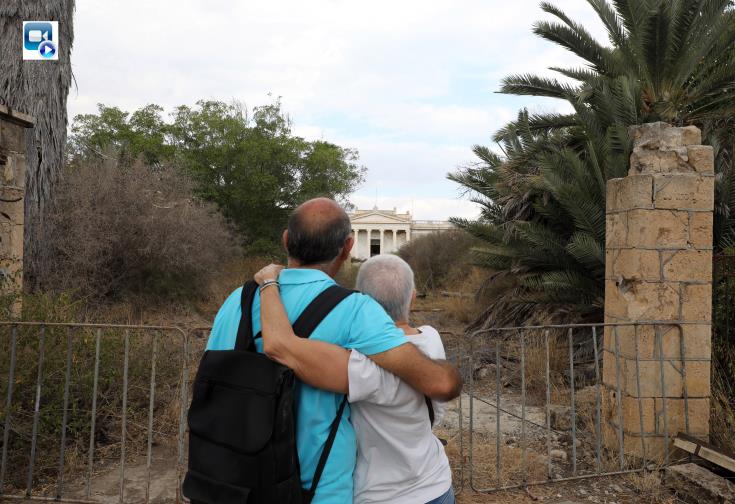His Department of Turkish and Middle Eastern Studies University of Cyprus organized on Thursday night an online event dedicated to closed city of Famagusta. At the event, coordinated by the professor of the department, Nikos Moudouros, the Turkish Cypriot researcher Nafia Akdeniz presented the findings of her research entitled "Narratives from Varosia: Resistance of memory and a questionable future". This research was the focus of the researcher's doctoral study, which was conducted at the "University of the Eastern Mediterranean" in 2021.
At the beginning of the event, Mr. Moudouros welcomed the audience and referred to the face and work of Ms. Akdeniz. Ms. Akdeniz, in addition to her scientific work in the field of communication, is also known as a poet and activist. Closing his introduction, Mr. Moudouros stressed that the online event takes place at a particularly critical juncture for the Varosi.
For her part, Ms. Akdeniz referred at the beginning of her presentation to the role of memory as a tool of resistance to time and suffering. The T / C researcher, after presenting the theoretical framework of her study, continued by stating that the object of her research was the narratives that Greek Cypriot residents of the closed city choose to share with us. In the process of studying these stories, the Turkish researcher conducted interviews and put under her microscope the social media where the people of Varos are active. At the end of this effort, an archive material of 82 hours or 815 pages emerged. Ms. Akdendiz took advantage of the findings of this research to convey the feelings of the people of Varosi to poetry, with which she is actively involved.
The stories of the people of Varos
In her research, Akteniz approached the closed city of Famagusta as a young ethnographer born after the dramatic Summer of 1974. In this context, she attempted to study and record the "other", ie the Greek Cypriots, in and from the perspective of "feminism". As she mentioned in the continuation of her presentation, the main dimensions of her research work were two: the narratives of the people of Varos and the use of these narratives.
Regarding the stories, Ms. Akdeniz shared examples that reflect the feelings of loss, "threshold", change and dealing with the future. Regarding the feeling of loss, a position of a resident of the closed city stood out, who characteristically pointed out to the researcher that "I am not interested in the building, its value, but the place where I lived. "I just want my place back." In the "threshold" part, the researcher referred to the case of a resident of the closed city, who is waiting for the day of her return to plant her plants in the land of Famagusta. Regarding the feeling of change, Ms. Akdeniz referred to the change of views and approaches of the people of Varos, both Greek and Turkish, after the operation of the roadblocks and the beginning of the bi-communal interactions. Finally, Ms. Akdeniz referred to examples that relate to the way the people of Varos approach the future of their city.
Concluding her presentation, the researcher summarized the two main uses of the above narratives in terms of the aspect of "resistance to oblivion". He referred to the example of a resident who pointed out to her that "my life did not start in 1974. I had life before the war. "I came to the city to reclaim the past." Regarding the part of "resistance to oppression", ie the rejection of the famous Turkish plan for the future of the closed city, Ms. Akdeniz referred to examples of Varosians who use various means, e.g. the internet, to keep the vision of return alive.
The researcher speaks to KYPE
After the end of Ms. Akdeniz's presentation, a discussion with the audience followed. In the context of the discussion, KYPE asked the Turkish Cypriot researcher to share her impressions on the way the Turkish Cypriot community approaches her work. What kind of messages does Ms. Akdeniz receive regarding the narratives of the Greek residents of Varos? What are the reactions of the Turkish Cypriots? Responding to KYPE, Ms. Akdeniz focused on the interaction of the two communities on the issue of Varos. The researcher stated that an atmosphere of cooperation has already been formed that is absent from the other cities of Cyprus. Referring to the "Famagusta Initiative", Ms. Akdeniz added that many Turkish Cypriots have already come in contact with the Greek Cypriot community and there is a discussion among them about the future of Famagusta while at the same time showing interest in the common life of the past. "The Turkish Cypriots who have memories of the city, refer to the city based on their own experience and come in contact with the Greek Cypriots. "This is something that is missing from the other cities."
The online event for the closed city of Famagusta, in which Ms. Akdeniz shared verses from some of her poems about Varosi, closed with an exchange of views and other questions, to which the Turkish researcher was asked to answer.
